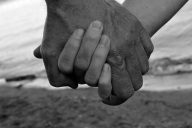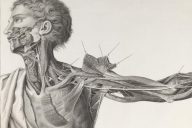“Gunpowder clings to me like perfume… Did I shoot this man? No holes in him but mine.”
Gunpowder clings to me like perfume. Who is this body in front of me? A hajji is dead, and that is enough. The books say I’m supposed to feel sick to my stomach—our glands are programmed against homicide—but that isn’t me. No one ever told me how good this would feel, firing on all cylinders, nicotine after sex. Did I shoot this man? No holes in him but mine.
Mine.
Am I smiling? I must be; the others are. LRAZ and Eight Mile, smiling.
“Fuck, that was some twenty-five to life shit,” says LRAZ.
Worst thing a man can do. No one can take this from me.
“Goddamn sir, you straight up executed his ass.” Eight Mile makes a gun with his fingers, points at that jihadi fuck while he does a little touchdown dance, careful to keep a hand on his rifle.
The new guy is rattled. His face blanches, like he did it. He’s trying not to look at me. “I-I s-saw it sir. He was going for his weapon.”
“Shit, if LT wasn’t so quick on the draw I woulda merc’d his ass. You think he shit hisself?” Eight Mile says.
“Fusel, you’re smelling the load in your pants, you scared bitch.” LRAZ says.
“You punk-ass—”
“Shut the fuck up, and watch your fucking sectors,” I say, but they keep their smiles and I don’t blame them. We just closed with and destroyed the enemy, every combat soldier’s wet dream. My brain feels like cotton balls soaked in eighty-proof. Fuck me, I just smoked a dude.
I aim my camera at the muj, laying face up. His pants are undone, swimming around his thighs. He’s dressed in a brown vest over his gray-blue shalwar kameez, and white high-top sneakers. A Chicom ammo harness is stretched across his chest, the pouches pregnant with ammunition. The camera lens focuses, then whines and winks. Now his body is immortal.
A story by Tim O’Brien comes to mind. In college, I read his reflection on killing a man. He tried to picture the guerilla in life, but could do nothing but stare at his body—jaw in his throat, slender, a star shaped hole where an eye once was. Back then, I thought, if that was one of my uncles lying at his feet I would forgive O’Brien. I search myself for a hint of his guilt, his empathic imagination, and find none. I admired O’Brien’s sympathy once, but I don’t have a conscript’s small heart. I volunteered for this. I did a warrior’s work.
Before college graduation, my adviser said the army was a waste of time.
“Why do you want to go to war? If you want to see it, just turn on the TV. Your family’s experience is such fertile ground for important academic work,” he told me. I was sick of being the victim in a family of fucking refugees. I never told him that I wanted to be the first kid in my class to get a confirmed kill—no one would call me a victim after that. Now, after months of training for this moment, months chasing muj through this valley, I have what I wanted at my feet.
Apache gunships float over the mountains, looking for targets. I stay with the hajji and the men spread out to take cover on a little berm around the fallow field. I place my orange nylon signaling-panel on the ground, and talk the helicopters onto the fleeing Taliban. The birds fly hungry circles above us, taking turns firing at an enemy I cannot see. Their guns stammer. Dust from their targets rises above the trees before dissipating.
“Tango-mike, White One,” the helicopters say on the radio, “Positive impacts on target. We are Winchester: thirty mike-mike, going off station.” The lead bird wags its angular body as a farewell, passing over the ridgeline. What power. I envy those omniscient wrathful airframes.
Sergeant Barker calls me on the radio to tell me to hang tight, the Afghans are arguing whether the Army or Police gets to take credit for my kill. Lieutenant Khan arrives in his Humvee too late for the fight. We say our hellos, half shaking hands, half embracing while placing our faces next to one another in a pantomime of kissing cheeks. He makes a show of putting on blue surgical gloves.
“I remembered,” he says, beaming.
Khan checks the man for booby-traps. He lies on top of him in a kind of embrace, his arms hooked around his shoulders. He uses his weight to flip the man up onto his side. There is nothing there, so I say clear, and Khan drops him, untangling himself from the Hajji. He crouches to examine my handiwork, tracing the entry wounds with his finger. He clicks his tongue at each pinprick hole—one above the hipbone, another through the rib cage, one just below the armpit, and one in the neck. Khan grimaces at the neck wound; pride rises and bakes in my chest. The exit wound is a flower of flesh, flaps and ribbons of skin and sinew dangle from the mess, flayed by a tumbling bullet. There is so little blood.
I tally each wound, two kill shots, and two maiming shots—four out of five fired. Fuck. I can’t believe I missed one at this range. My pride becomes bitter and burnt.
Khan picks up the Kalashnikov, removing the banana clip, and racks the action open. A fat, short bullet pirouettes in the air and drops by my feet. He examines the steel and wood with care, smelling the chamber, and peering down the sights. He grins, pointing to the barrel.
“Bent,” he says in English, “to walk in mountain, like cane.” He hands the fighter’s rifle to me.
The stamp on the receiver says 1954, accompanied by squat utilitarian Cyrillic. The folding stock is wrapped in clear plastic bicycle tape to cushion the rough stamped steel. The dark wood hand guard is smooth from wear. Was this Kalashnikov his most prized possession? I heft it in my hands. How many others died carrying it? I admire this thing of wood and steel that outlived its owner. It is heavy with history. I wish I could keep it, but war trophies are prohibited.
We go through the man’s belongings: a pair of folding scissors, a broken mirror, a wad of Afghani totaling about twelve dollars, and a mobile phone. There is a bullet hole through the wad of bills. A prayer cap, folded in half, juts out of his pocket. I imagine him muttering his prayers, kneeling, prostrating himself towards Mecca.
Khan rummages through the little pockets on the ammo harness. He smiles—opening his palm to reveal two shiny green eggs with tin fuses protruding from their tops. He asks me if he can keep the grenades. I ask him why he wants them.
“For style,” he tells me.
I say he cannot.
The ammo harness contains a plastic packet of naswar snuff, a cellphone charger, and three Kalashnikov magazines. One magazine has an oblong gash in the center. The spring is cut in half, and rounds rattle inside the steel case. I didn’t miss, but it’s still not a kill shot.
I write a careful inventory of the dead man’s things, placing each item into a separate Mylar evidence bag. Khan leaves to report back to his commander.
For a moment, I’m alone with the man. I stare at him. His eyes are covered in dust, cornea milky like the pale flesh of oysters. I can’t stand the idea of specks and grit clinging behind my eyelids, so I try to close his eyes, but it doesn’t work like in the movies. They remain open, scratched now. He looks kind, but how much can anyone know from a face?
The blood has left his skin, which takes on the tone of the haggard earth. He has a broad scholarly forehead, and his beard softens his jaw—which gives him a genteel air. The skin around the eyes and brow are smooth, unlined. What gave him such comfort that war did not score his face? The ends of his lips are curled into a cryptic smile. Perhaps it is the expression of release, or a taunt, a reminder that Americans made war on Vietnamese a generation ago. What would mom say if she knew? A chill seeps into my brow, though my hand wipes away sweat.
I have to kneel—something swirls in my chest. The thrill dissipates then evaporates altogether. I feel unfastened, as if I could float away. If this is what coming down feels like, I can’t hack it.
His mobile phone rings in its evidence bag. I hold it in my hand, feeling the vibration, but don’t answer. The phone keeps ringing, as if to deny that its owner is dead. I smoke a cigarette, waiting for directions to come over my radio, but it stays silent.
We wait an hour for the radio to bring us order. A logistics convoy behind us complains that we’ve blocked the road, and Barker jokes that they are worried they will miss taco Tuesday at the big FOB.
Khan returns with an ambulance, meandering behind him. The army will take the body, he says. The Afghans strap the man to a plastic spine board, taking their time. One of the Afghan medics stands up to consider the him, then kicks him in the temple. He kicks him again, harder this time. He kicks him as many times as he can before his comrades drag him off. Khan watches this, explaining that the medic lost many friends to the Taliban on this road. How many times did he rush to the aid station to save his comrades when he knew it was too late, that he should switch off the siren? I want to hate the man too, to feel the medic’s rage, but I cannot. There is only a simmering, disadvantaged sympathy, but for whom, I cannot say. The dead man’s cell phone trembles, trills.
LRAZ picks it up and opens the bag.
“Sir, I want to punk whoever’s calling so bad.”
Again, I say no.
![]()
When we return to base, I deliver the evidence bags to a soft-looking civilian wearing a camouflaged uniform with the name of a private company where the “U.S. Army” should be. The bag with the grenades comes open, and they spill onto his desk. He jumps backward into his filing cabinet, his arm wraps around his face in anticipation of an explosion that doesn’t come. He cusses and tells me that I should know better than to bring live ordnance into his office. Fucking Pussy. I sign a hand-receipt, relinquishing control of the dead man’s possessions.
Wiping his brow, the civilian tells me that The Colonel wants me to bring him the rifle.
The grinning, pale faces of the staff officers greet me in the operations center. They take the man’s rifle from my shoulder without asking. I grasp the pebbly grip of my Beretta to calm myself. They smear their greasy fingerprints across the steel, destroying what little trace of evidence might remain. There is something lascivious in the way they put their fingers inside the action and caress the stock. They’re drunk on the smell of burnt gunpowder, lost in their fantasy. They hand back the rifle, and I wipe the fry grease from the grip with a handkerchief. Without knowing, I’ve begun to polish it. I place it on the table, trying my best not to stare at it, not to covet it.
The Colonel enters and claps me on the back. “Couldn’t be prouder. My boys are killers.” He chomps on an unlit cigar.
What does he know about killing? The bits of tobacco leaf in his smile look like shit. I make my exit leaving the Kalashnikov on the Colonel’s desk. He’s admiring the man’s weapon in his hands before I’m out the door.
The intelligence officer stops me in the hallway. “Hey man, I heard. You doing okay?”
“I’m fine.”
“Come here, I want to show you something. We started exploiting the phone. Got so much already. You know he was a cell leader?”
I didn’t.
“His name was Zafar. We’ve been trackin’ him all year,” he says.
His name was Zafar.
How does this change anything? I would be dead if our roles were reversed, then my name wouldn’t matter. Why should a name make someone less worthy of death?
“Hey, you wanna see what we just pulled off the phone—” He turns his computer monitor around to show a video. “This looks like it was taken right before you guys showed up.”
Zafar sits in a copse of apple trees with his fellow guerillas. His rifle cradled in his lap, he strokes his moustache with the tips of his fingers.
“Ya’ll were about to be on YouTube,” the intel officer says.
The men around Zafar chatter with their hands. The poor sound quality makes harsh digital noises where voices should be. The other fighters are excited for what they will do, or what they have already done. Only Zafar is tranquil, awash in stuttering digital Pashto among young men excited for more war. Does he already know his fate? I want him to look into the camera, so that I can see what his living eyes will reveal, but he shies away. I watch him in his final moments on this earth, fearing—without reason—the inevitable. Something catches the group’s attention—they rise to their feet. Zafar snatches the phone. The last image on the screen is his palm, obscuring his face.
![]()
I sit at my computer to compose my after action report. My fingers won’t animate on the keys. I tell myself to just start at the beginning.
White Platoon, Apache Troop proceeded down route Montana to interdict forecasted ambush set for task force’s supply convoys. In the vicinity Deh-e-Afhganan village the platoon encountered an enemy formation waiting in ambush. Enemy was composed of two squad-strength rifle sections, an RPG team and a light machine gun team. Platoon reacted to contact, repelling a numerically superior force. Bravo Section achieved fire superiority, suppressing the enemy on their flank.
I stop typing. Breathe. I want to get this right. It’s my kill until I hit send, then it’s property of the U.S. Army. The action, the story, will no longer be mine.
White Platoon Leader led Alpha section, who assaulted through the enemy position. They encountered a lone fighter who appeared dead. As they approached, he reached for his weapon.
—I killed a man.
I type it, hoping that seeing the words on page will impart some truth. I stab the backspace key until the words disappears.
Zafar’s red prayer cap juts out of my mind.
—I’m a murderer.
It lingers on screen. Why type that? This is war. Highlight, delete.
PL engaged and destroyed the target. Enemy fled to the north/northwest. Air weapons team arrived on station and maintained direct fire contact. They reported positive impacts on target. No further report on their battle-damage assessment was available. PL estimates the gunships inflicted one or two enemy KIA. It is likely that the enemy sustained multiple wounded. S2 indicates that confirmed enemy KIA was Taliban cell leader.
I stare at the screen. The words seem to stare back. The Colonel and his men have what they wanted. Save. Attach. Send.
![]()
That night Barker tells me it was a good kill.
“I didn’t sleep after my first. You shouldn’t expect any tonight.” He says this with the respectful care of an undertaker. “You’re gonna wonder if it could’ve happened another way. I’m telling you it couldn’t.”
His shoulders relax and his eyes steady as he speaks. I imagine he is relieved because he must think we are the same now, bonded by a common act. His eyes scan the text of my face. Apparently satisfied, he says nothing else and leaves me alone in my plywood room.
I settle onto my bed to clean my rifle. When I finish, everyone else is asleep or masturbating quietly. I clean my rifle again, wanting nothing but clarity. The steel and aluminum parts are scattered like a soothsayers bones, but impart no truth to me. I lie down and close my eyes, but the regret of being helpless to erase the dust in Zafar’s eyes loops onto itself, weaving into an endless knot that I trace in my mind, unable to find the loose end.
*
Photo by dcJohn


















